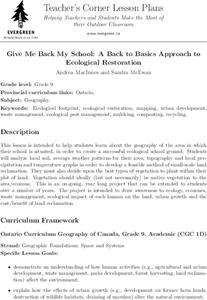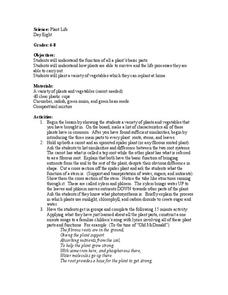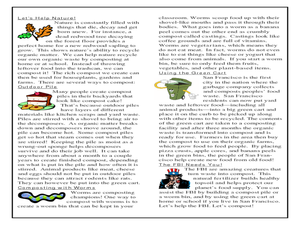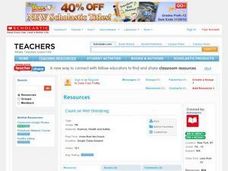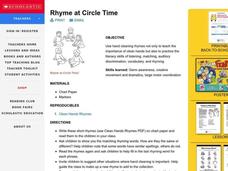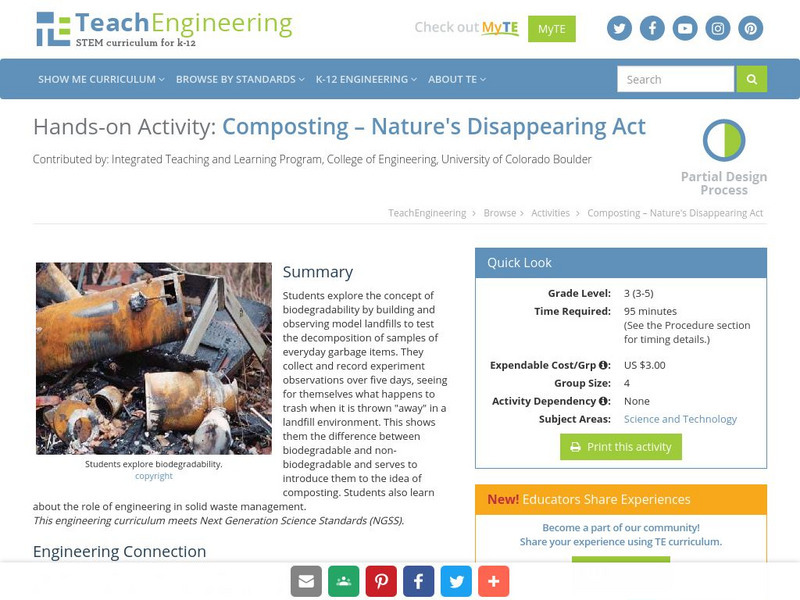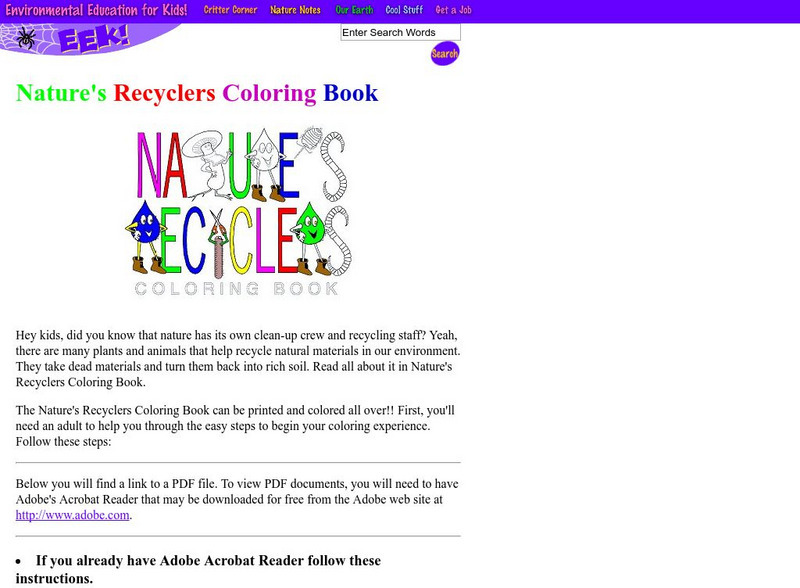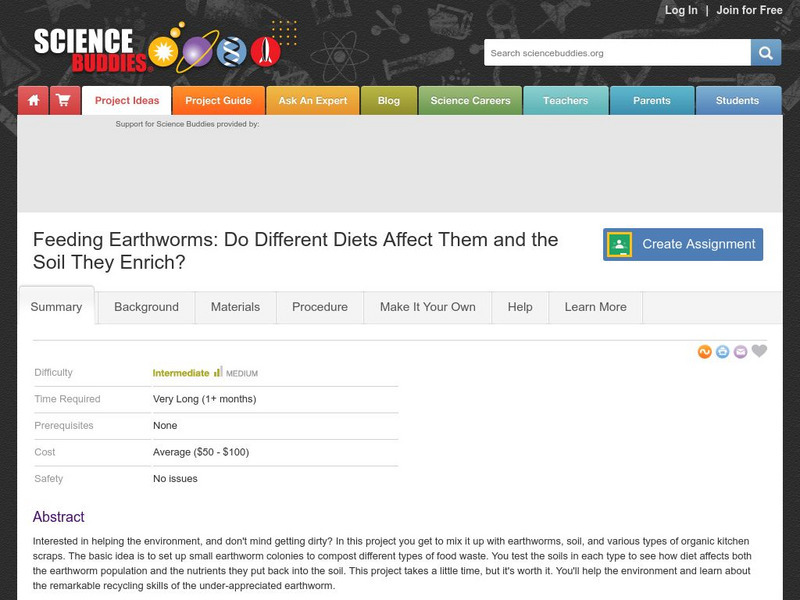Curated OER
Give Me Back My School: A Back to Basics Approach to Ecological Restoration
Ninth graders research local geography to create successful, ecological school landscaping. They determine soil type, average weather patterns and temperature graphs and use the information to select ideal plants and plant maintenance...
Curated OER
Plant Life
Students study plant parts and their functions. In this plant life lesson students participate in an activity of planting plants.
Curated OER
Let's Build a Worm Bin
Students explore the process of decomposition. In this ecology and measurement lesson, students prepare a worm home to be used for vermicomposting. Students weigh a group of worms and the added food, recording this information on a data...
Curated OER
The Effects of Trash and Garbage On the Environment
Students recognize the importance of solid waste management. In this science lesson plan, students analyze individual solid waste management habits as they enhance their knowledge of solid waste disposal and the recycling process.
Curated OER
Save the Planet!
Third graders explore the Recycle City Web site. They examine ways to save the environment. They write a short interview between a news reporter and an environmental expert. They practice acting out their news report.
Curated OER
Sowing Seeds
Students observe earth science by participating in a planting activity. In this seeds lesson plan, students identify the process for seeds to transform into plants which eventually produce food. Students sow seeds in the ground and...
Curated OER
Tag the Germs
Students review what happens when they wipe germs off their hands with a wet wipe. Next, they play a game of tag in which some students are germs and others are wipes. They move around while music plays, stop when it stops, and the wipes...
Curated OER
Count on Wet Ones??
Students listen to fingerplay songs, clean hands with Wet Ones wipe or squirt of hand sanitizer, sing Five Little Monkeys Jumping on the Bed, discuss what would happen if monkeys were germs on their hands, and use their hands and...
Curated OER
Earth Kids: Kindergarteners Taking Care of the Earth
Students explore a variety of ways of how to care for the environment in the nine lessons of this unit. They observe how to be responsible "Earth Kids."
Curated OER
Rhyme at Circle Time
Students study the importance of clean hands and practice the literacy skills of listening, matching, auditory discrimination, vocabulary, and rhyming. They illustrate their rhyme chart with drawings or photos taken doing the different...
Curated OER
God's Creation
Second graders explore religion by analyzing the state of the country. In this American creation lesson, 2nd graders read that God created the world and therefore the United States and all of the beautiful things within the country....
Curated OER
Fish Parasite Survey
Students survey and dissect as many fish as possible. They count nematodes, cestodes and crustaceans on the fish, fill out autopsy reports, and transfer data to a chalkboard data table. Students graph the results of the entire class...
Curated OER
Contrasting Cinderellas
Students compare and contrast the traditional Cinderella to the modern-day fairy tale, Cinder Edna. In this fairy tales instructional activity, students read both stories and construct a Venn diagram to compare the two fairy tales....
Curated OER
Recycled Water?
Learners participate in a hands-on activity to investigate how water is recycled in a small environment, and determine how water is cycled on earth.
Curated OER
Worms in a Bottle
Students gain a better understanding of the worm and its role in the recycling of organic materials into simpler forms by constructing worm bottles and observing for 60 to 90 days.
Texas A&M University
Aggie Horticulture Network: Composting for Kids
Use this resource to learn about how we make compost and how we use it to grow gardens.
Other
Master Composter
Learn about composting, and find our how it helps connect people to the Earth's natural processes.
TeachEngineering
Teach Engineering: 3 Rc (Reduce, Reuse, Recycle and Compost)
In this lesson, students expand their understanding of solid waste management to include the idea of 3RC (reduce, reuse, recycle and compost). They will look at the effects of packaging decisions (reducing) and learn about engineering...
TeachEngineering
Teach Engineering: Composting Nature's Disappearing Act
In this activity, students explore the idea of biodegradability by building and observing a model landfill. This serves as an introduction to the idea of composting. Students learn about the role of engineering in solid waste management.
TeachEngineering
Teach Engineering: Environment
Through 10 lessons and more than 20 hands-on activities, students are introduced to the concept of an environment and the many interactions within it. As they learn about natural and human-made environments, as well as renewable and...
Other
Waste Watch: Recyclezone: Activity Zone: Wonderful Worms: Composting
Learn how to create a worm-powered compost system. Find materials needed, where to buy worms, what to put in the compost, and questions and answers about making nutrient-rich compost from table scraps.
Environmental Education for Kids
Eek!: Be the Change: How to Be a Vermiculturist
Learn all about worm composting in this article.
Environmental Education for Kids
Eek!: Nature's Recyclers Coloring Book
Did you know that nature has its own clean-up crew and recycling staff? Yeah, there aremany plants and animals that help recycle natural materials in our environment. They take deadmaterials and turn them back into rich soil. Use this...
Science Buddies
Science Buddies: How Diets Affect Earthworms and the Soil They Enrich
In this environment-oriented experiment, you will mix it up with earthworms, soil, and various types of organic kitchen scraps. The basic idea is to set up small earthworm colonies to compost different types of food waste. You test the...


